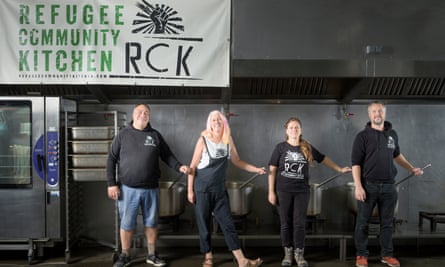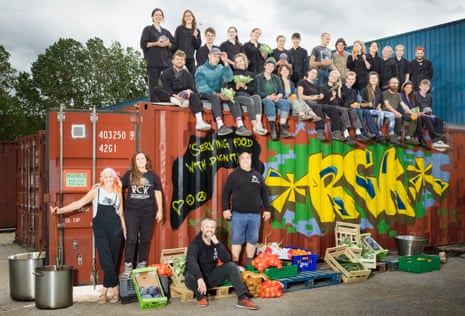At 5.30pm, two unmarked white vans swing in to the car park of Puythouck, a nature reserve on the outskirts of Dunkirk, northern France. A couple of dozen men are waiting for them, but within a minute or two, many more emerge, like spirits, from the dense trees that surround the lake. Soon there are maybe 200. They are, I’ll find out, mainly Kurds and remarkably, considering the journeys they have taken and their present accommodation, most are in buoyant mood and well turned out. Only when you look closer do you notice that a disproportionate number are limping and a couple are on crutches; injuries picked up as they attempted to escape this place and find a better life.
The vans belong to Refugee Community Kitchen, a charity started in December 2015 by four Londoners, and this year’s winner of OFM’s Outstanding Achievement Award. When I visited in early September, Refugee Community Kitchen was providing a free dinner every evening in Puythouck and also at another site in Dunkirk, a leisure centre that housed around 1,000 people, including many women and children and at least 130 unaccompanied minors. In four years, the charity has served nearly 2.3 million mainly plant-based meals in France and the UK, through the help of 20,000 volunteers. On the menu tonight is a coconut and chickpea dal with potatoes and a tomato, cucumber and lettuce salad.
It’s good, nutritious food. Part of the charity’s ethos is that the people they serve should have agency over their meals, which should be “culturally appropriate”. To this end, a condiments table is a key part of their offering: there is hummus, made this afternoon, plus tubs of sumac, onions, za’atar, pickles and salt with which people can garnish their food. A large urn dispenses “sweet, sticky” tea.
As the volunteers set up serving tables, many refugees are happy to share their stories (or talk about Brexit, the ever-present threat of eviction and Manchester United). One, in excellent English, tells me that he wants to join his wife and three children who live near Solihull. His youngest daughter is seven months old, and he has not seen her since the spring. “Too long,” he says with a sad shake of his head. The day before he’d stowed away on a truck only to turn on his GPS and find it was heading deeper into the continent, not to the UK. “I don’t want to do it illegally,” he says. “But if I can’t do it legally, that’s what I have to do. I’ll keep trying, trying, trying.”
It might surprise you to learn that the population of refugees and migrants in northern France is still so large. It still surprises the founders of Refugee Community Kitchen: Steve Stavrinides, 48; Paula Gallardo, 51; Sam Jones, 45; and Janie Macintyre, 56. Well, it does, and it doesn’t. They began their work after seeing the photograph of Alan Kurdi, the three-year-old Syrian boy drowned in the Mediterranean in September 2015, and reading newspaper reports of the Calais Jungle, a camp made on polluted wasteland that was soon home to around 4,000 people, including large populations from Eritrea, Afghanistan and Syria.
Jones recalls: “We were tapping into a collective consciousness that loads of people were tapping into: we’re rich and we’re privileged as a society and individuals, we can see suffering and we feel powerless and not represented by our governments. And actually it’s close enough, we can do something.”
“It’s no longer in a country I’ve never been to,” adds Stavrinides. “It’s on my doorstep.”
None of them had much previous experience with charity work. They had met in the early 1990s on the free-party scene, running raves in the UK and Europe. But it occurred to them that they might have transferable skills: Stavrinides and Gallardo are both involved in organising music festivals (Stavrinides runs stages at Glastonbury and Boomtown); Jones is a chef; Macintyre works in education and has been an activist for many years.
“I’d been working festivals, weddings and events, where I’d be putting up infrastructure and bringing it down and putting it away,” says Gallardo. “And I thought, ‘Can’t we just take it to Calais? Put it up and leave it there.’ Because I did just feed 500 or 1,000 at a wedding and it’s easy.”
It wasn’t that simple. The Calais camp grew and grew, until ultimately the French government cleared it, after multiple attempts, in October 2016. At this point, it wasn’t obvious whether the Refugee Community Kitchen needed to exist any more, certainly not in northern France. The group decided to start outreaches in the UK to serve hot meals to the homeless. The first opened in Camden, north London in early 2017, and there are now four in London and one in Edinburgh. They also began to think about following the trail of refugees through Europe: two trucks were bought, one with catering facilities, and Stavrinides and Jones got their HGV licences.
“We were like, ‘Well, we’ve got to take this somewhere else haven’t we?’” says Stavrinides. “‘We’re going to go on the road, go to Greece, because that’s where the need is going to be.’” He goes quiet, then continues: “And we didn’t. Because the need didn’t go anywhere.”
This is a topical concern for the Refugee Community Kitchen. The week after I visit – a night when they served more than 1,200 meals (and ran out of food) – the camp in the leisure centre in Dunkirk was cleared by French riot police, watched by officials from the Home Office. People were loaded onto buses, families were split up and they were dispersed across France.
Similar evictions have happened before, and the founders of Refugee Community Kitchen have learned that they usually achieve very little. Within a few days, a trickle of people return, and before long hundreds and then thousands congregate once again in the area around Calais and Dunkirk. “It’s been going on for 20 years in this area,” says Gallardo. “It does often feel like it’s going to end, but we’ve realised we are going to be here a long time. And we’ve realised also that we are committed and quite good at it.”

It’s clearly not easy: all the founders have other jobs and take turns to come to France. It is also a never-ending struggle to recruit volunteers and attract donations, especially when the migrant crisis slips off the news agenda.
“One of the most simple things you can do is put a hot bowl of nourishing food in the hands of someone who’s hungry,” says Macintyre. “To see their faces as they taste something that maybe reminds them of home or their mum used to do, it’s so rewarding just to know it has such an impact.
“The act of getting 1,000 meals a day isn’t that simple,” she goes on, “but putting a meal in someone’s hands is.”
refugeecommunitykitchen.com
